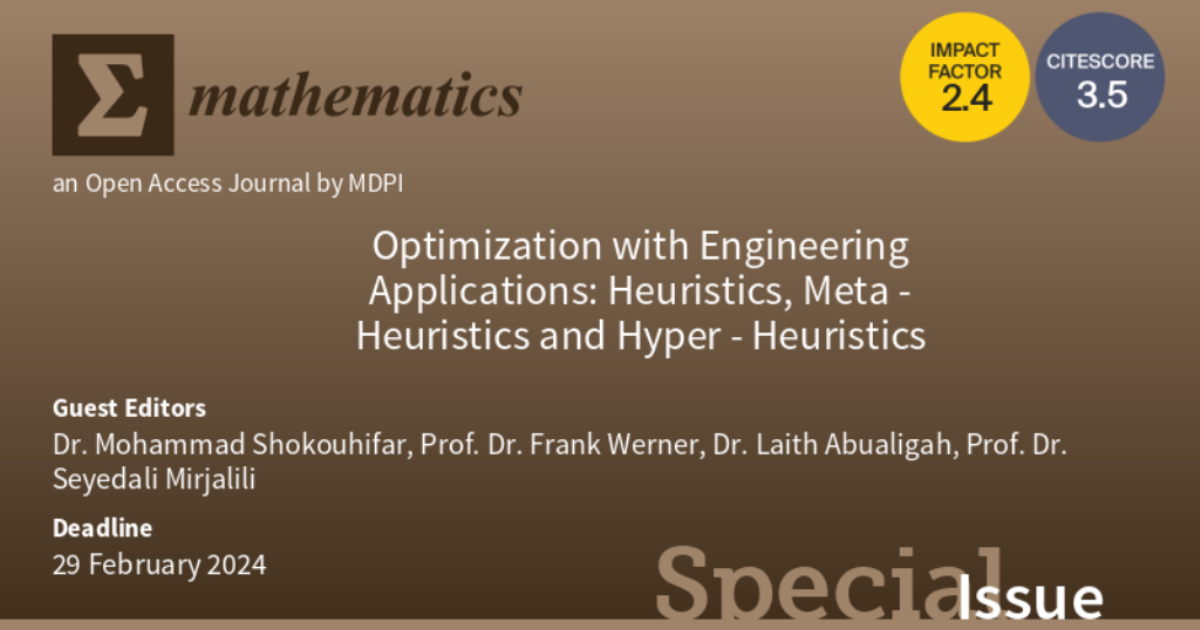Optimization with Engineering Applications: Heuristics, Meta-Heuristics and Hyper-Heuristics
A special issue of Mathematics (ISSN 2227-7390).
Deadline for manuscript submissions: closed (29 February 2024) | Viewed by 3606

Special Issue Editors
Interests: artificial intelligence; optimization algorithms; biomedical engineering; remote healthcare monitoring; prognosis and diagnosis; machine learning; deep learning; swarm and evolutionary algorithms; hyper-heuristic algorithms; biomedical image processing; biomedical signal processing; time-series analysis; Internet-of-Things; wireless body sensor networks
Special Issues, Collections and Topics in MDPI journals
Interests: scheduling; development of exact and approximate algorithms; stability investigations; discrete optimization; scheduling with interval processing times; complex investigations for scheduling problems; train scheduling; graph theory; logistics; supply chains; packing; simulation; applications
Special Issues, Collections and Topics in MDPI journals
Interests: arithmetic optimization algorithm (AOA); bio-inspired computing; nature-inspired computing; swarm intelligence; artificial intelligence; meta-heuristic modeling; optimization algorithms; evolutionary computations; information retrieval; text clustering; feature selection; combinatorial problems; optimization; advanced machine learning; big data; natural language processing
Special Issues, Collections and Topics in MDPI journals
2. Centre for Artificial Intelligence Research and Optimisation, Torrens University Australia, Brisbane, QLD 4006, Australia
Interests: artificial intelligence; metaheuristics; engineering optimization; evolutionary algorithm; swarm intelligence; photonics
Special Issues, Collections and Topics in MDPI journals
Special Issue Information
Dear Colleagues,
Solution search methods for solving optimization problems can be categorized into exact, knowledge-based heuristic, and random-based meta-heuristic algorithms. Although exact search methods consistently achieve an optimal solution, such practices are not applicable to complex engineering problems that belong to the class of NP-complete/hard problems.
Over the past few years, various heuristic, meta-heuristic, and hyper-heuristic optimization algorithms have been introduced and applied to tackle the complexities of real-world engineering problems. Heuristics are high-speed application-specific methods, but they do not effectively investigate the search space. In contrast, meta-heuristics can obtain higher quality solutions due to their ability to cope with high computational complexity. As an extension to heuristics, hyper-heuristics provide agile and high-quality solutions that are capable of changing from one application variant to a new one quickly, which is important for solving real-time engineering problems.
This Special Issue aims to report the recent advances in optimization methods from theoretical, methodological, and applied viewpoints. We invite researchers and participants from academia and industry to submit their original research and review articles concerning new and existing heuristics, meta-heuristics, and hyper-heuristics for solving optimization problems in different branches of engineering.
Dr. Mohammad Shokouhifar
Prof. Dr. Frank Werner
Dr. Laith Abualigah
Prof. Dr. Seyedali Mirjalili
Guest Editors
Manuscript Submission Information
Manuscripts should be submitted online at www.mdpi.com by registering and logging in to this website. Once you are registered, click here to go to the submission form. Manuscripts can be submitted until the deadline. All submissions that pass pre-check are peer-reviewed. Accepted papers will be published continuously in the journal (as soon as accepted) and will be listed together on the special issue website. Research articles, review articles as well as short communications are invited. For planned papers, a title and short abstract (about 100 words) can be sent to the Editorial Office for announcement on this website.
Submitted manuscripts should not have been published previously, nor be under consideration for publication elsewhere (except conference proceedings papers). All manuscripts are thoroughly refereed through a single-blind peer-review process. A guide for authors and other relevant information for submission of manuscripts is available on the Instructions for Authors page. Mathematics is an international peer-reviewed open access semimonthly journal published by MDPI.
Please visit the Instructions for Authors page before submitting a manuscript. The Article Processing Charge (APC) for publication in this open access journal is 2600 CHF (Swiss Francs). Submitted papers should be well formatted and use good English. Authors may use MDPI's English editing service prior to publication or during author revisions.
Keywords
- engineering optimization
- mathematical modeling
- combinatorial optimization
- robust optimization
- exact methods
- heuristic algorithms
- meta-heuristic algorithms
- hyper-heuristic algorithms
- evolutionary computation
- swarm intelligence
- local-search algorithms
- multi-objective optimization
- constraint handling methods
- hybrid optimization methods
- fuzzy sets and systems
- machine learning
- deep learning
- graph theory and applications
- scheduling problems
- resource allocation problems
- vehicle routing problems
- big-data analytics
- signal/image processing
- manufacturing systems
- chemical processes
- Internet-of-Things








